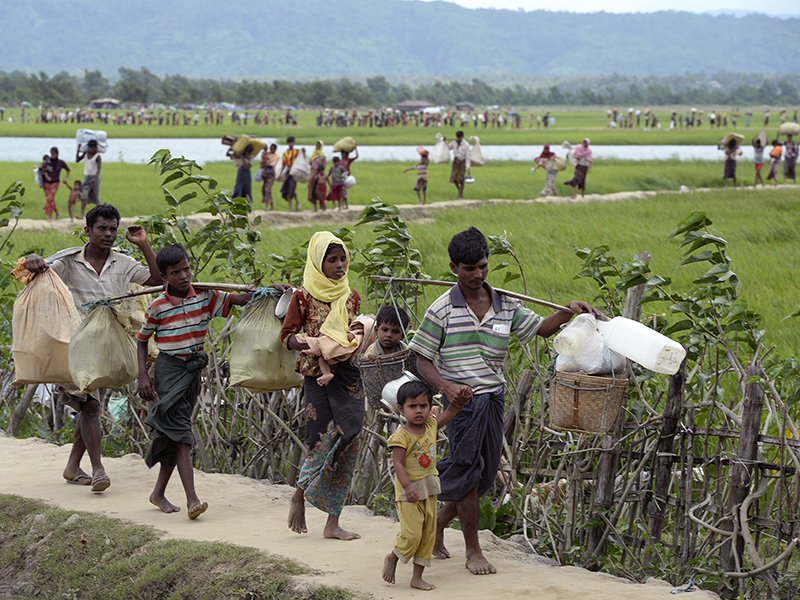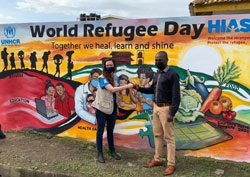The U.S. Must Help Protect the Rohingya Fleeing Myanmar
By Naomi Steinberg, Guest Contributor
Oct 20, 2017

Rohingya Muslim refugees who were stranded after leaving Myanmar walk from the 'no-man's land' between Myanmar and Bangladesh into Palongkhali in the Bangladeshi district of Ukhia on October 19, 2017. At least 10,000 Rohingya Muslims sought to cross the border this week in a new surge from Myanmar's Rakhine state.
(Tauseef Mustafa/AFP/Getty Images)
The brutal efforts of the Myanmarese military to completely eradicate the Rohingya people is incomprehensible. UN Secretary General Antonio Guterres describes the crisis as the “world's fastest developing refugee emergency, a humanitarian and human rights nightmare."
After Cambodia, Bosnia, Rwanda—after the Holocaust—how is it possible that we are again witnessing ethnic cleansing?
Even though the Rohingya have lived in Myanmar for generations, the military government does not acknowledge this population as part of the diverse ethnic make-up of the country. They are not citizens. Their movement is restricted. They need permission to marry. They are essentially prisoners in their own country. And, then there is the violence.
In fits and starts for years, the Rohingya have been viciously targeted by the military and local militias who regularly use rape as a weapon of war and murder as a tool to intimidate. Since August, the violence has increased exponentially. Entire Rohingya villages have been razed, and the brutal attacks and murders are too many to count.
The New York Times recently reported of a young, Rohingya mother being attacked while her baby was stripped from her arms and then tossed into a fire.
As a result of this barbaric and relentless targeting, more than half a million Rohingya have fled Myanmar. They have risked their lives in rickety boats to make it to Bangladesh, itself an impoverished country struggling to respond to this refugee crisis.
There are now more Rohingya living in Bangladesh than in Myanmar, and that simply is not sustainable.There must be an immediate cessation of violence in Myanmar; and, for those who have fled, they must have access to basic protection and humanitarian assistance. However, no Rohingya should be expected to return home unless they do so by choice under safe and dignified conditions.
In addition, for the most vulnerable of the vulnerable, those for whom returning home or staying in Bangladesh will never be an option, strategic resettlement must be a viable solution. The United States is one of the only countries to resettle Rohingya, and like other refugees welcomed to this country, they have made their new homes here and become proud new Americans.
The United States has turned away people seeking safety and freedom from ethnic cleansing before. We as the Jewish community know this history all too well.
We must let our elected officials know that our country can never make that mistake again, and that welcoming Rohingya is the right, humane thing to do.
Naomi Steinberg is HIAS' Senior Director for Policy and Advocacy. To urge Congress to resettle more refugees in the United States, take action here.


